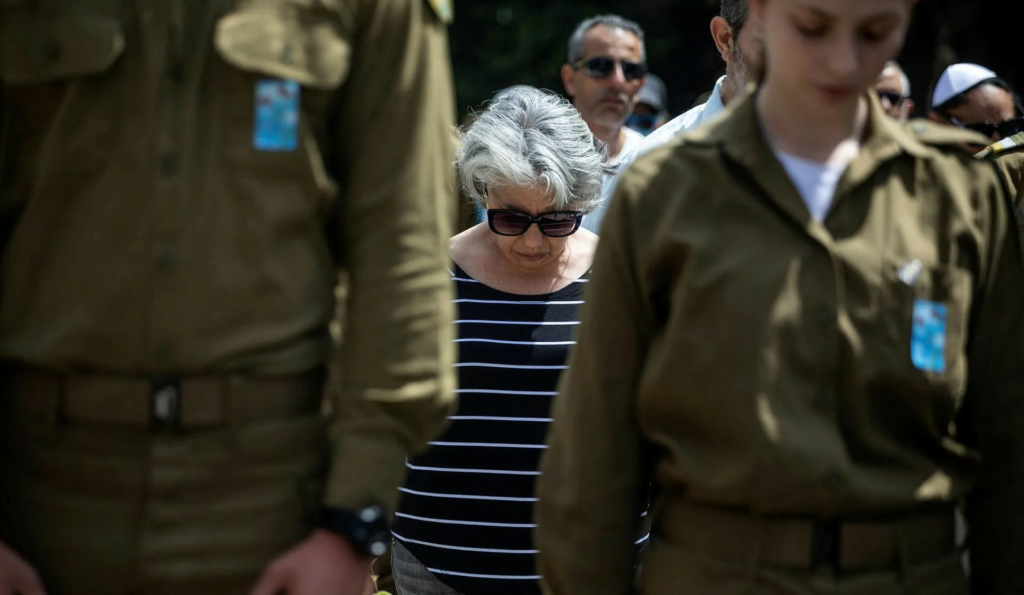
May the people of Israel remember its sons and daughters, the faithful and the brave, who sacrificed their lives in the war for the rebirth of Israel, and may the people of Israel remember the sons and daughters, the faithful and the brave, of the Palestinian people, who sacrificed their lives in the war for the rebirth of their people and their land.
May Israel remember and mourn the beauty of youth, the heroic passion, the sacred will and the self-sacrifice of those who perished in the weighty battle – Jewish and Palestinian. Their dead, too, had the beauty of youth and heroic passion and sacred will and self-sacrifice. May the people of Israel also remember the Palestinian victims, its own victims.
When the siren sounds Tuesday, I will be thinking, as I do every year, of Pvt. Gideon “Pauli” Bachrach, who was killed at Tantura in 1948 while trying to rescue wounded comrades, and whose namesake I am, and also about the tens of thousands of Palestinians who died in all of Israel’s wars and in between them. It’s impossible not to think about them as well, especially on Memorial Day.
How can you not admire their determination and courage, the righteousness of their struggle and the unbelievable personal sacrifice that went with it?
Holocaust Remembrance Day, the image of fire burning my grandmother and grandfather always appears before my eyes. On Memorial Day, what comes to mind are the images and the people I have written about during more than 35 years of covering the occupation and the struggle against it.
After all those long, damned years, it’s impossible to stand still on Memorial Day and think only of the young people of your own nation who fell, ignoring those of the other nation.
On Tuesday, I will think about Ayid Salim from Azzun, the most recent fatality I have written about. Soldiers fired five bullets into his torso as he fled, because they thought he threw firecrackers at them. I will think of 16-year-old Hamza al-Ashkar, the fifth fatality in a year from the Askar refugee camp in Nablus, who had thrown a stone at an armored military jeep. In any other occupied land – Ukraine, for example – we would consider a boy like him a hero; here, he is considered a terrorist and his killing an act of heroism.
I will also be thinking of Yousef Muhaisen, who was shot dead two days before his 23rd birthday. His friends called him “Chik Chak” – Israeli slang, meaning “very quickly” – because that’s how everything went with him, including his death at the hands of soldiers.
And about Omar Khmour, 14, from the Deheisheh refugee camp, who in January was shot in the head by a soldier and killed, and whose classmates bring food to his grave every day, because one of them dreamed that Omar was hungry.
It’s impossible not to think about them, and even more so on Memorial Day. And also about the fallen from further back in the tunnel of time: about the son of Faiza Abu Dahuk, who was born and died in the late 1980s at an IDF checkpoint whose soldiers refused to let her get to the hospital; about Kamala Sawalha, a 21-year-old student with two babies, who died after soldiers fired at the taxi she was riding in; about all the dead Gazans whose stories I tried to make public over the years – including thousands in the 17 years since Israel stopped allowing Israeli journalists into the Gaza Strip to do their jobs.
Who knows what has happened since to Hassan Abu Hajer, who was injured as a child? Both of his legs and one arm were amputated, and he lost his sight in one eye.
For five years, while using a wheelchair and with his remaining arm, he took care of his son Mahmoud, who was shot in the head by IDF soldiers in Gaza and became comatose. I met him for the first time in June 1994, in Room 602 at Gaza City’s Shifa Hospital. The boy died five years later.
Is it possible for me not to think of him on Memorial Day? For me not to remember him, just because he’s not Jewish? Not to mourn his fate and that of his father, who is unlikely to still be alive after all his tribulations?
These thoughts and memories are considered heresy in Israel, a desecration of a holy day; a mental defect at best, and treason at worst.
They are neither. On Memorial Day, one can and should commune with the memory of the fallen – all of the fallen.
